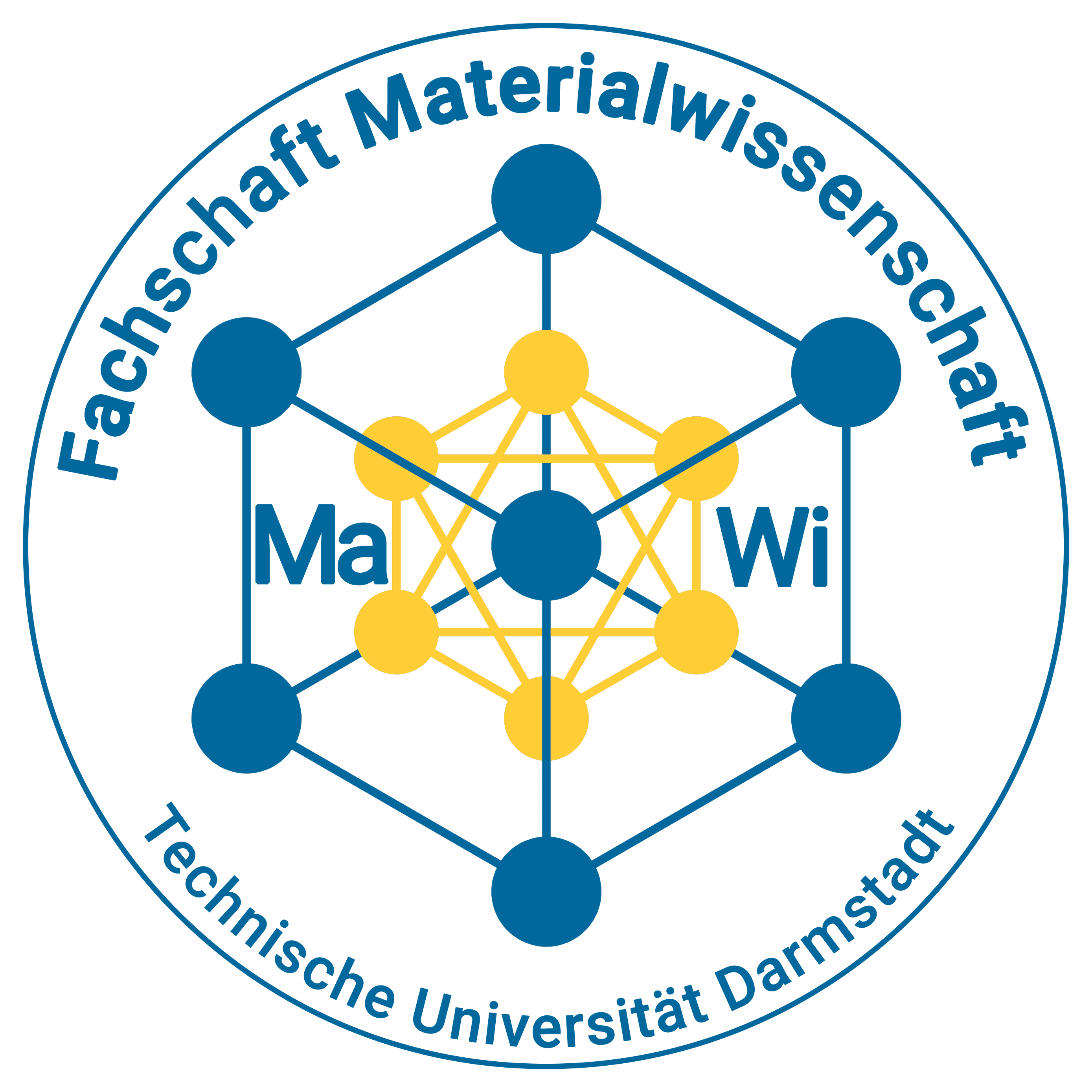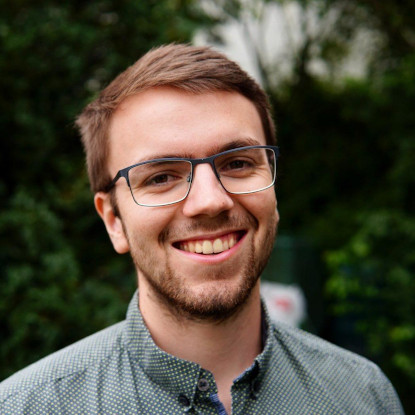Materials science is a combination of natural sciences such as physics and chemistry, and engineering sciences such as mechanical and electrical engineering. Depending on this, there are also overlaps with other natural sciences such as biology. Depending on one's own interests, one can develop in very different directions. In many cases, it is not possible to strictly separate the individual disciplines from each other. For example, there are solid-state physicists, structural chemists or even materials engineers who do very similar things to the groups at our department.
What is unique about our department is that all these different directions work together and that we have very different perspectives on material analysis and development. Another great advantage is that we have our own department of materials science in Darmstadt and are not subordinate to chemistry, physics or mechanical engineering as at other universities. In addition, the fact that we have our own department means that there are also a large number of working groups (about 20) that conduct materials research. From physical metallurgy to the electronic structure of materials and material modelling (computer simulations), there is a great variety of disciplines. The focus is clearly on inorganic materials and functional materials. Functional materials are materials such as magnets, semiconductors (for solar cells) and superconductors, which have special functional properties. However, in the course of studies, constructive material properties are also very much highlighted and one can also delve into this direction without any further problems. However, if you want to do something with polymers or organic materials, the choice of subjects in materials science is much more limited.
Another reason that speaks clearly for materials science in Darmstadt is the excellent supervision ratio. The number of students compared to professors and scientific assistants is really good. This means that you always have a contact person to whom you can ask questions about your studies. Also the surrounding field at the faculty is very personal, since one knows almost everyone in comparison to mass study courses. It is also very easy to find a job as an assistant scientist (work in the laboratory or as a trainer). This way you can earn some extra money and usually also learn something for your studies.
Because the department is independent, it also has its own building, the MaWi building. The building houses the Learning Center of Materials Science (with a reference library), numerous seminar rooms, a computer pool, numerous laboratories and offices. In the exam phase there is still a place to study in the learning center or in one of the seminar rooms. This means you are not dependent on the libraries on the Lichtwiese (directly opposite) or in the city center, which are usually overrun, especially in the exam phase.
In the beginning, one hears mainly physical, chemical, material science and mathematical basics. In the first semester the emphasis is on getting everyone up to speed (in math, physics and chemistry). The subject matter clearly goes beyond the school curriculum, but not yet to a great extent. In addition, you will get a deep introduction to crystallography, which should be completely new for most people.
The second semester has the clear focus on thermodynamics with phase diagrams (in MaWi 2) and the complete basics in physical chemistry 1. Furthermore, the mathematical and physical knowledge is deepened. Already in the first two semesters there are practical courses, on the one hand the MaWi basic practical courses and on the other hand the physics basic practical courses, which are organized by the department of physics. In the first two semesters, the practical courses are organized by the Department of Physics. During the practical courses, students get an insight into measurement methods of different physical quantities and an overview of the physical fields of electricity, nuclear physics, mechanics, optics and thermodynamics. In the MaWi practical courses, the focus is initially on the measurement of various material parameters (strength, electrical conductivity, etc.).
In the third and fourth semester, the focus of the studies is clearly on the materials side of materials science. In MaWi 3, students learn how defects in crystals affect the strength and other properties, and in technical mechanics how components deform and how to calculate their load. In the fourth semester, the students learn about crack propagation under peridodic loading in MaWi 4 and a short introduction to the finite element method using numerical methods in order to be able to calculate such loading cases in reality. In addition, one gets an insight into the different production methods of metals and ceramics and their advantages and disadvantages in material production and processing.
At the same time, the introduction to electrical engineering in the 4th semester slowly starts the track of functional material properties. This will then be expanded significantly in the 5th semester. On the one hand you learn the basics of quantum mechanics in Physical Chemistry 2 and on the other hand you learn the basics of solid state physics in MaWi 6. In short, the following questions are answered: Why and how do solids like metals conduct heat? How can the heat capacity of these solids be predicted and how can their dependence on temperature be explained? Why do metals conduct electricity well? Why are there semiconductors and insulators and what does conductivity depend on?
Building on the knowledge gained in the 5th semester, the 6th semester will continue with MaWi 7 in this field. At the same time the topics are perhaps even more exciting: How does a superconductor work and why does superconductivity exist at all? How do the different types of magnetism work and what causes them? At the same time, Construction Materials provides a more in-depth introduction to the most important construction materials in materials science. This subject is divided into two parts. The first part gives an introduction to the most important alloys such as steel, aluminum alloys, superalloys and titanium alloys. The second part then deals with ceramics (including coatings), composites and polymers. An important aspect in each case is why certain materials have better properties than others. This aspect is much more important than memorizing characteristic values.
In the 6th semester the bachelor thesis is written. Many write this externally in companies, but most of them at the university. For the bachelor thesis you can basically choose a subject area that makes particularly interesting things from your perspective. For example, if you are interested in magnets, you would ask in the group “functional materials”, which has magnetic materials as its main focus. Most of the time it is no problem to find a job for a thesis in the desired group (at least I have never heard that it didn't work out). Often you can ask for a special topic or you will simply get suggestions from which you can choose one. You should then also get a PhD student or postdoc as a supervisor who will help you with all your questions and give you introductions to the different laboratories.
The MaWi study program is relatively fixed in the Bachelor's degree with regard to the MaWi modules. However, one can develop very freely in the elective area. In the non-technical area, language courses are the classic choice. For example, there is an English language course only for materials scientists, which you can easily get into. In addition, the Language Center offers numerous language courses which are in great demand. However, there are also numerous other options, such as business studies, history courses and so on.
In the technical area you can also give your material science studies a focus. For example, you can choose modules such as high temperature materials, which are actually offered by the department of mechanical engineering. In addition, you can listen to organic chemistry and subjects about polymers if you want to specialize in polymers. Another possibility are environmental science subjects from the Faculty of Civil and Environmental Engineering or subjects from Earth Sciences. Space enthusiasts can listen to subjects such as “aerospace propulsion”.
A list of all electives approved so far can be found here (opens in new tab).
In Darmstadt there are two large TU campuses. One is the Lichtwiese and the other is the city center. The Department of Materials Science is located at the Lichtwiese, but in the first semesters you will still hear many basic courses like physics and math at least partly in the city center. The connection between the two campuses is very good by bus and bicycle, as both can be reached very well by public transport. At the moment the Lichtwiesenbahn is also being built, which should enable you to take the streetcar from the main station and the city center directly to the Lichtwiese. All in all, however, it can already be said that everything in Darmstadt can be easily reached by bicycle, bus and train.
Due to the large number of students there are many student parties and some pubs. For larger clubs or bars, Frankfurt and Mainz can be reached relatively quickly by train. By the way, the semester ticket for the RMV area is included in the semester fee.
Apart from that, leisure time can be very varied, especially thanks to the wide range of sports on offer. Various sports and fitness courses are offered by the university either for free or for a small fee. Furthermore, there is the possibility to use a disc golf course, beach volleyball courts and the university's own outdoor swimming pool free of charge.
Finding an apartment in Darmstadt is a little difficult. Especially at the beginning of the semester it is often only possible to find expensive or badly located apartments and shared apartments. The chances of finding accommodation in a hall of residence are also not too great, even if you apply to the Studentenwerk early enough. The best way to find an apartment is therefore either in the middle of the semester or through friends and acquaintances.
1. write us (the student council) an email or use our contact form . You are always welcome to contact us if you have a problem or a question.
2. if you want to get a taste of the everyday life of a MaWi student, you can find all information about MaWi for one day here.
3. go to the Darmstadt university and career information days (Hobit). At the information desk of the Department of Materials Science you will find professors, staff and students, who you can ask your questions to.
4. especially the female MaWi junior staff can get to know the department better on the Taster Day for Schoolgirls and on Girls' Day.
5. watch the videos on the Online-Self-Assesment (OSA) page and take the tests
6. contact the faculty and look at the faculty page for prospective students



